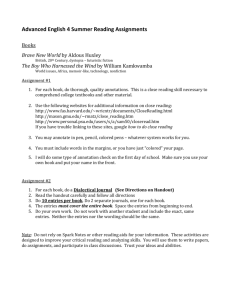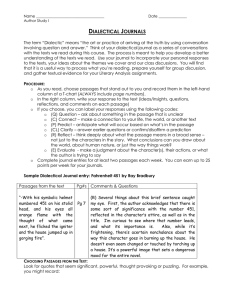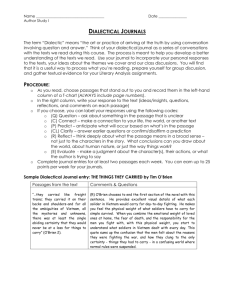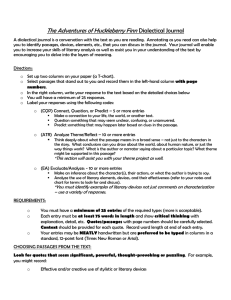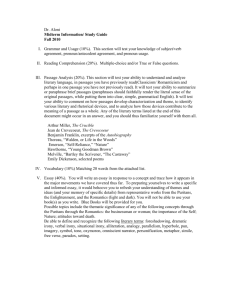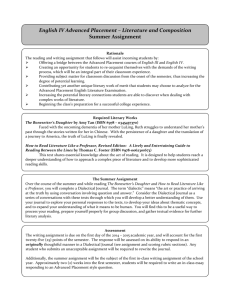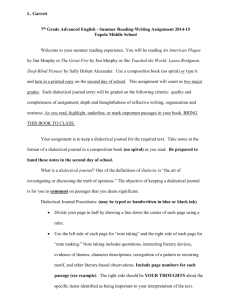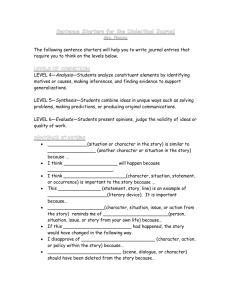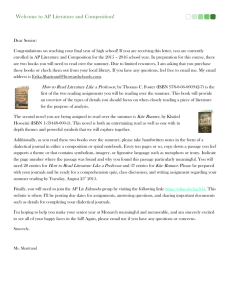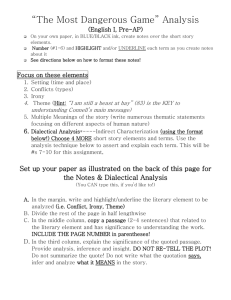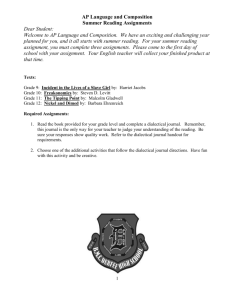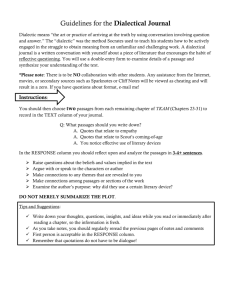DIALECTICAL JOURNALS
advertisement
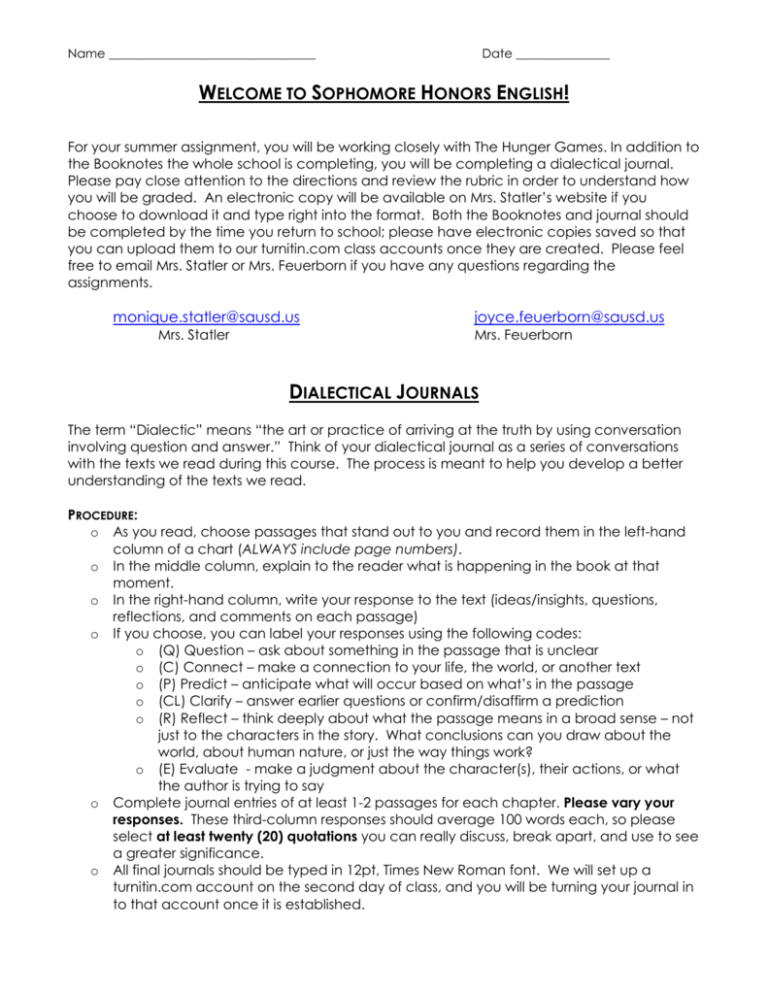
Name _________________________________ Date _______________ WELCOME TO SOPHOMORE HONORS ENGLISH! For your summer assignment, you will be working closely with The Hunger Games. In addition to the Booknotes the whole school is completing, you will be completing a dialectical journal. Please pay close attention to the directions and review the rubric in order to understand how you will be graded. An electronic copy will be available on Mrs. Statler’s website if you choose to download it and type right into the format. Both the Booknotes and journal should be completed by the time you return to school; please have electronic copies saved so that you can upload them to our turnitin.com class accounts once they are created. Please feel free to email Mrs. Statler or Mrs. Feuerborn if you have any questions regarding the assignments. monique.statler@sausd.us Mrs. Statler joyce.feuerborn@sausd.us Mrs. Feuerborn DIALECTICAL JOURNALS The term “Dialectic” means “the art or practice of arriving at the truth by using conversation involving question and answer.” Think of your dialectical journal as a series of conversations with the texts we read during this course. The process is meant to help you develop a better understanding of the texts we read. PROCEDURE: o As you read, choose passages that stand out to you and record them in the left-hand column of a chart (ALWAYS include page numbers). o In the middle column, explain to the reader what is happening in the book at that moment. o In the right-hand column, write your response to the text (ideas/insights, questions, reflections, and comments on each passage) o If you choose, you can label your responses using the following codes: o (Q) Question – ask about something in the passage that is unclear o (C) Connect – make a connection to your life, the world, or another text o (P) Predict – anticipate what will occur based on what’s in the passage o (CL) Clarify – answer earlier questions or confirm/disaffirm a prediction o (R) Reflect – think deeply about what the passage means in a broad sense – not just to the characters in the story. What conclusions can you draw about the world, about human nature, or just the way things work? o (E) Evaluate - make a judgment about the character(s), their actions, or what the author is trying to say o Complete journal entries of at least 1-2 passages for each chapter. Please vary your responses. These third-column responses should average 100 words each, so please select at least twenty (20) quotations you can really discuss, break apart, and use to see a greater significance. o All final journals should be typed in 12pt, Times New Roman font. We will set up a turnitin.com account on the second day of class, and you will be turning your journal in to that account once it is established. Name _________________________________ Date _______________ Sample Dialectical Journal entry: To Kill A Mockingbird by Harper Lee Quotation “He said it began the summer Dill came to us, when Dill first gave us the idea of making Boo Radley come out” (3). Context Analysis The narrator, Scout, is casually discussing how her brother broke his arm and is relating that incident to the summer that her friend Dill came to visit. The repetition of the pronoun “it” three times in this paragraph creates suspense and serves as a lead in to the flashback of three years ago. The reader questions how Jem “got his arm badly broken” and wonders what the “it” is that began when Dill arrived. The reader questions what events from three years ago led to the accident. The mystery further intensifies with the children’s antics of touching Boo’s house and culminates at the end of the chapter with the “flick” of a shutter. Why is Boo a “malevolent phantom” and why are the children afraid to touch the house? But more importantly, how does “it” lead to the breaking of Jem’s arm? By provoking these questions, Harper Lee sets the mysterious tone of the novel. CHOOSING PASSAGES FROM THE TEXT: Look for quotes that seem significant, powerful, thought provoking or puzzling. For example, you might record: o o o o o o o o Effective &/or creative use of stylistic or literary devices Passages that remind you of your own life or something you’ve seen before Structural shifts or turns in the plot A passage that makes you realize something you hadn’t seen before Examples of patterns: recurring images, ideas, colors, symbols or motifs. Passages with confusing language or unfamiliar vocabulary Events you find surprising or confusing Passages that illustrate a particular character or setting Name _________________________________ Date _______________ RESPONDING TO THE TEXT: You can respond to the text in a variety of ways. The most important thing to remember is that your observations should be specific and detailed. You can write as much as you want for each entry. The sentence starters are just ideas. Please use sentence variety and vary the beginnings and structure of your sentences, and please use the analysis section to really dig deeper into the text. (Connection) This reminds me of another specific incident (text-to-self, text-to-world, text-totext) when . . . I infer / conclude that . . . because Based on this line, I predict . . . (expound) I am confused here because . . . These words/actions reveal _____ about the character because . . . This line reinforces the theme of . . . (explain) The author’s tone/attitude (specify) is revealed when . . . The author’s figurative language (metaphor, simile, symbolism, etc.) The author’s use of imagery . . . These details show / reveal . . . (explain) The author’s use of diction (word choice) demonstrates . . . The syntax (sentence structure and length) here (serves what purpose?) . . . The purpose of the (repetition, simile, allusion, statistic, etc.) is to. . . This reveals the theme of ________ because. . Basic Responses o Raise questions about the beliefs and values implied in the text o Give your personal reactions to the passage o Discuss the words, ideas, or actions of the author or character(s) o Tell what it reminds you of from your own experiences o Write about what it makes you think or feel o Agree or disagree with a character or the author Higher Level Responses o Analyze the text for use of literary devices (tone, structure, style, imagery) o Make connections between different characters or events in the text o Make connections to a different text (or film, song, etc…) o Discuss the words, ideas, or actions of the author or character(s) o Consider an event or description from the perspective of a different character o Analyze a passage and its relationship to the story as a whole Name _________________________________ Date _______________ Grading Dialectical Journals A Quotations and Plot Details Detailed, meaningful Interpretation Thoughtful, avoids cliches Literary Elements Questions and Connections Discusses diction, imagery, syntax, etc and how these contribute to meaning Insightful personal connections, thoughtprovoking questions Coverage of text Covers text thoroughly Presentation Neat, organized, looks professional, follows directions B C D Less detailed but still good Few good details Hardly any good details Vague, unsupported, plot summary Plot summaries and paraphrases Lists literary elements but little discussion of meaning Few literary elements, almost no discussion of meaning Few connections, obvious questions Few connections, no questions Covers most parts, but quickly Way too short Neat but hard to read, doesn't follow directions Hard to read, doesn't follow directions Intelligent, discusses theme Includes them but doesn't explain how they contribute to meaning Some personal connections, questions arise from text Covers important parts thoroughly Neat and readable, follows directions
